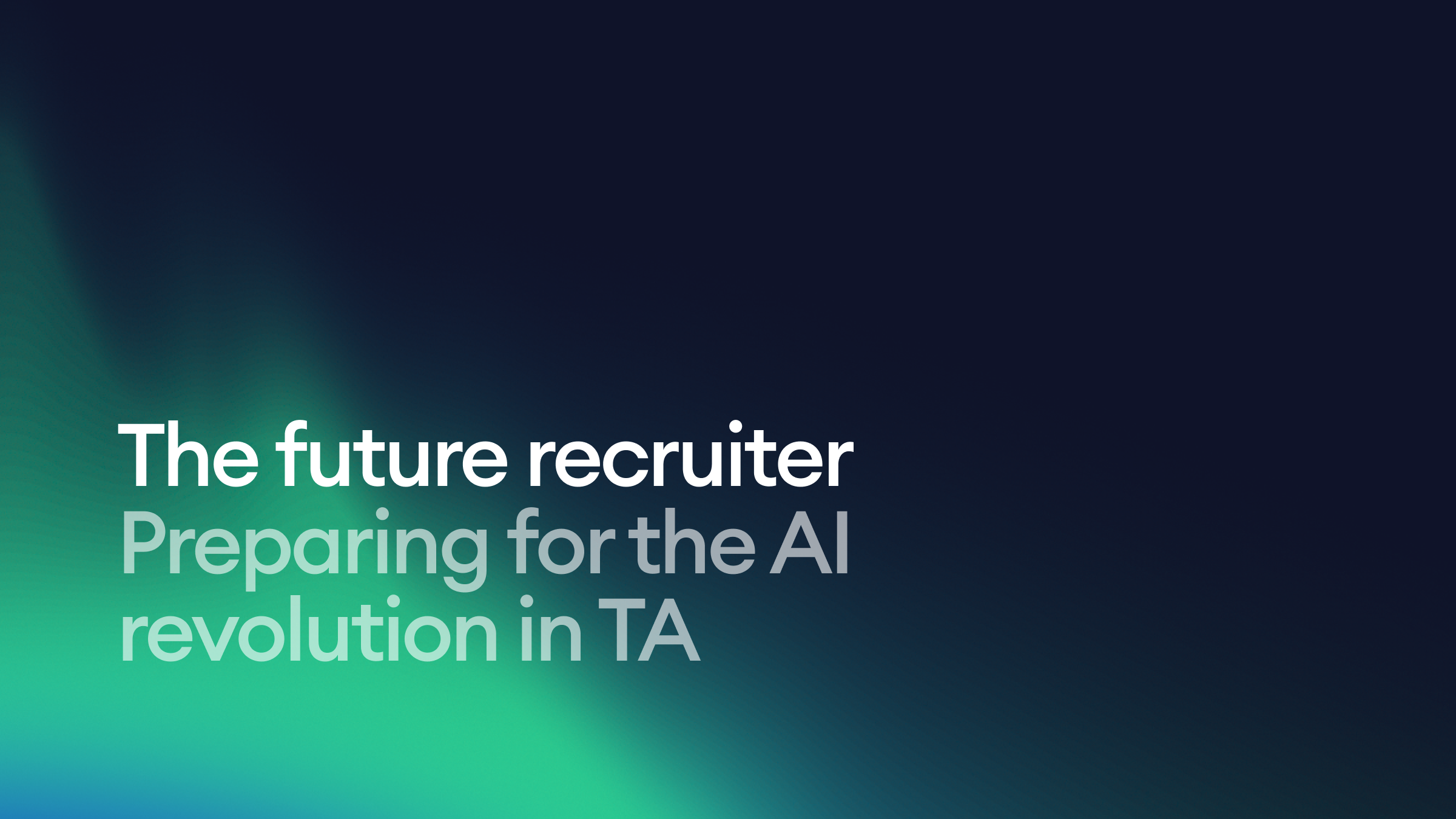Key takeaways:
- Agentic AI is the next frontier in recruiting: These autonomous systems will handle complex workflows across platforms, freeing recruiters for high-impact decisions. Early adopters will gain a major competitive edge.
- AI will augment, not replace, human decision-making in hiring: While AI streamlines workflows and provides data-driven insights, human expertise remains essential for final decisions, relationship-building, and ethical oversight.
- Customization will define AI’s impact: AI isn’t one-size-fits-all. As AI evolves, recruiters and their organizations will increasingly tailor AI tools to align with their hiring strategies, culture, and personal preferences.
"I think we are about a year, 18 months away," says Nick Krekis, AI Program Manager at Miro, when asked about the timeline for advanced AI adoption in recruiting. "The agentic layer will be able to do all of the automated work in recruiting without needing to copy and paste between systems."
The "run" stage of AI adoption in recruiting is fast approaching. Unlike early AI tools that assist with tasks in a limited capacity, this stage will introduce systems that function as true strategic partners, automating workflows and augmenting human decision-making. Organizations that prepare now will be ahead of the curve as these technologies mature.
And while many recruiting teams are still in the early stages of AI adoption, those that have implemented AI across their hiring processes are experiencing significant productivity gains. In fact, recruiters whose teams have centrally implemented AI get through 66% more screens per week compared to those using AI only individually.
With these productivity gains already emerging, we set out to understand how AI is reshaping the recruiter’s role and what the future holds for talent acquisition. We spoke with Siadhal Magos, CEO of Metaview, Nitin Moorjani, Senior Director of Talent Operations at Automattic, and Miro's Nick Krekis (AI Program Manager) and Rico Habraken (Talent Operations Manager). Their insights reveal a future where AI doesn’t replace recruiters, but enables them to focus on relationship-driven work while technology handles increasingly complex workflows.
Agentic AI: The next evolution
Agentic AI represents the next evolution in recruiting technology — AI systems capable of executing complex workflows across multiple platforms with minimal human input. Unlike traditional AI tools that require specific prompts, agentic AI operates proactively, coordinating tasks and seeking human input only at key decision points.
Rico describes an emerging reality: "Imagine receiving an app notification that someone on your team has resigned. You tap ‘Yes’ to hire a backfill, and the AI recruiting agent immediately suggests relevant candidates to review based on past searches, schedules interviews, and adds them to your calendar. All in minutes."
These workflows — once the realm of science fiction — are now being actively developed. Instead of recruiters needing to manually move information between systems, their roles will evolve to designing and overseeing AI-driven hiring processes.
Decision augmentation: Beyond information gathering
As the tech advances, we’ll also start to redefine how AI supports hiring decisions. While AI likely won’t make final hiring choices on its own, it will increasingly start to analyze patterns, streamline candidate shortlisting, and automate much of the early screening process.
"The real challenge," says Siadhal, "is determining how comfortable we are with AI influencing hiring decisions. Do we want AI to play no role at all, or do we allow it to offer strategic recommendations?"
As AI evolves, it will analyze thousands of hours of past interviews and assess candidates against multiple factors like:
- Alignment with the specific skills identified as “must-haves” in the intake meeting
- Similarity to past hires who became top performers
- Patterns in historical hiring decisions
- Cultural indicators that match the organization's values
This advanced analysis goes beyond simple keyword matching on resumes. AI derives insights from actual interview conversations, identifying patterns that are often invisible to even the most experienced recruiters. However, organizations will have to establish guidelines to make sure AI remains a tool for augmentation rather than operating as an independent decision-maker.
Customization and personalization at scale
As AI capabilities advance, customization will also become increasingly important. AI will be deeply personalized at multiple levels:
- Company-level customization: Organizations will train AI on their culture, values, and success patterns to align with broader hiring goals.
- Team-level customization: Different departments will configure AI to understand their unique requirements and workflows.
- Individual-level customization: Recruiters will adjust how they incorporate AI into their day-to-day workflows based on personal experience, preferences, and hiring strategies.
This tiered customization makes the recruiter’s role increasingly about system design — deciding what aspects of the process should be automated, how AI should contribute to evaluating candidates, and where human touchpoints remain essential.
"Increasingly, the recruiter's job will be about weighting, evaluating, and verifying AI outputs," says Siadhal. “‘How do I want my AI to operate for me?’ That’s the real question.”
Some recruiters may embrace AI for initial screenings, while others might prioritize it for pre- and post-interview communications while maintaining direct candidate interactions. The key is that recruiters will have the power to customize their AI partnerships to align with their unique approach to talent acquisition.
Transforming the candidate experience
The candidate experience is undergoing a significant transformation. Personalized AI chatbots now provide immediate, 24/7 responses to candidate inquiries using natural language that reflects a company's voice and culture.
Nick shares his vision for this evolution: "The other key element of the process is the candidate experience. For a candidate to have a personalized chatbot based on all of their conversations, preparing them for the next stage — it's interesting to consider whether recruiters would still want to be in the loop on that, obviously this will depend on the type of hiring that’s being done."
AI avatars may conduct preliminary screenings, allowing candidates to interview on their own schedules rather than coordinating with recruiters. Siadhal speculates on the possibilities: "The CEO of Zoom has discussed the idea of people having AI avatars to attend meetings on their behalf. This could mean recruiters using avatars trained on their communication style to handle initial interviews. If an AI can replicate 80% of what a recruiter might say, is that better than missing an interview entirely?"
Despite these advancements, human interaction will remain essential. Siadhal notes: "As a society, I don’t think we’ll accept complete AI-driven communication. We’ll expect transparency — knowing when we're engaging with AI versus a real person. Regulations and standards will need to ensure this distinction."
This evolving dynamic creates a multi-layered interaction model where candidates engage through various channels while still receiving a consistent, personalized experience. Rather than reducing human involvement, AI enhances it by allowing recruiters to focus on meaningful conversations rather than logistical tasks.
The organizational transformation
For recruiting organizations, implementing AI requires structural preparation, including:
Defining human-in-the-loop boundaries
Determine where human judgment is essential versus where AI can operate autonomously. Rico explains that successful AI implementation requires more than just launching a tool — it demands intentional rollout and skill-building: "It’s really hand-holding at the start when you go from crawling to walking to running. It’s about habit stacking. Doing one thing and repeating that thing until it’s second nature.”
Developing integrated tech ecosystems
Make sure specialized AI recruiting tools connect seamlessly with existing infrastructure. Nitin explains: "Point solutions excel at specific tasks, but they must integrate smoothly with the broader tech stack."
Partnering across the business
Strengthen collaboration between recruiting and tech teams. Nick highlights: "The key to success is the partnership between recruiting and the broader team."
Creating verification systems
Identify authentic candidates amid an increase in AI-generated applications. Nitin warns: "It's easy to mass-submit applications using AI, sometimes copying answers directly. Companies need strategies to detect this and maintain application integrity."
The human element: More important than ever
With AI taking over time-consuming and manual tasks, recruiters can redirect their focus toward creating meaningful connections and making big-picture process improvements. This shift allows them to engage more deeply with candidates, refine hiring strategies, and provide a more personalized experience throughout the recruitment process.
Nitin underscores this: "Smart companies will recognize that AI frees up time for strategic and creative work. It's a long-term investment, not just a short-term cost-saving measure."
Advanced AI will return recruiting to its roots as a relationship-driven industry. With automation handling routine admin tasks, recruiters can spend more time understanding candidates holistically, coaching hiring managers, and curating compelling candidate experiences.
Siadhal sees this as a revival of traditional recruiting values: "Recruiting was once deeply relationship-driven. Recruiters committed their careers to specific industries, built trust with decision-makers, and became invaluable connectors. AI allows us to return to that."
While AI enhances efficiency, the core objective remains unchanged: securing top talent in competitive markets. Siadhal reiterates: "Even if AI streamlines every step of the hiring process, companies will always need human recruiters to gain a competitive advantage in attracting the best talent."
Preparing today for tomorrow's capabilities
To prepare for an AI-powered future, recruiting pros should:
- Develop a learning mindset to embrace AI’s evolution rather than seek mastery of static tools.
- Focus on skills AI can't replace: relationship-building, ethical judgment, and strategic thinking.
- Build cross-functional partnerships with tech teams to stay ahead of AI developments.
- Encourage a culture of experimentation with AI tools.Establish ethical frameworks for AI use, particularly around decision augmentation and candidate data integrity.
Siadhal envisions this shift: "Creating an environment where recruiters are empowered to leverage AI and share their learnings will drive the next evolution in hiring."
Success in the AI era will depend on how well organizations blend technology with human expertise, balancing automation with personal insight.
The future of recruiting lies in leveraging AI to enhance human capabilities. Rather than replacing recruiters, AI streamlines operations, allowing professionals to dedicate more time to strategic decision-making and personalized engagement with candidates.


